Over the last 30 years, many countries have decriminalized same-sex sexual activities, recognized trans identities and introduced non-discrimination legislation. Some form of LGBTQ civil society—community centres and health clinics, social, support and activist groups, Pride organizations—has sprung up in almost every country in the world.
Yet 70 countries—about 35 percent of nations in the world—still have laws making same-sex sexual activity illegal, according to a 2019 report by ILGA World, the International Lesbian, Gay, Bisexual, Trans and Intersex Association. While some are infrequently enforced remnants of history, others are new and harsh. Gabon, for example, banned gay sex just last year.
“Some countries are attempting to roll back progress that has been made,” says Neela Ghoshal, senior researcher in the LGBT Rights program at Human Rights Watch. “The moment we’re in right now is defined by reactionary forces attempting to regain ground.” Around the world, right-wing populist leaders, including Donald Trump in the United States and several Eastern European leaders, have been using LGBTQ people as pawns to play to their base, which has sometimes stirred up hate toward queer people. And in some countries, the COVID-19 pandemic has increased demonization of and discrimination against LGBTQ people. In Panama, for example, a gender-based quarantine system initially led to discrimination against trans people, though the government made an effort to fix the problem.
Of course, state-sponsored homophobia and transphobia are not the only struggles. In many places, neighbours, religious leaders and police officers don’t need sanction from the state to discriminate, defame, harass, assault, torture or even murder LGBTQ people.
“The moment we’re in right now is defined by reactionary forces attempting to regain ground.”
All of this is hard to measure. “Information about the lived realities of lesbian, gay, bisexual, trans and gender-diverse persons around the world is, at best, incomplete and fragmented; in some areas it is non-existent,” states the 2019 report to the United Nations Human Rights Council, written by Victor Madrigal-Borloz, the council’s independent expert on protection against violence and discrimination based on sexual orientation and gender identity.
Despite information gaps, some generalizations are possible. Being poor, for example, usually makes things worse, Ghoshal says. In many countries, a certain level of economic well-being allows people to remove themselves from some of the worst forms of discrimination and abuse.
Stories of LGBTQ struggle and activism inevitably raise the question of how to help. Ghosal advises that those wanting to support people in other countries should first learn the details of a country’s unique situation, including the organizations working there, their approaches and their specific needs. Following the lead of local organizations is paramount: For example, some want to see their governments embarrassed on social media. For others, it’s a wasted effort—or worse, a trigger for crackdowns that can endanger people’s lives. Similarly, you may want to support refugee and asylum programs who help get endangered people out of desperate situations—however, activists may prefer support directed on the ground to help them build strong, sustainable, locally-created and led LGBTQ movements and institutions.
Money is usually helpful, and some countries have national organizations or networks that can direct funds where they are most needed. However, Ghoshal warns that donations should be handled thoughtfully and humbly. “There are people who pose themselves as saviours,” she says. “I’ve seen problematic GoFundMe campaigns that place people from the Global North as the ones who are going to solve all the problems. It’s about not using allyship to seek attention for yourself.”
Here’s a look at nine countries (in alphabetical order) where LGBTQ people are facing unique and pressing challenges right now, as well as a check-in with frontline activists in four of those countries. The news isn’t all dire: We’ve also included one country where LGBTQ activists have had some recent victories.
International LGBTQ flashpoints
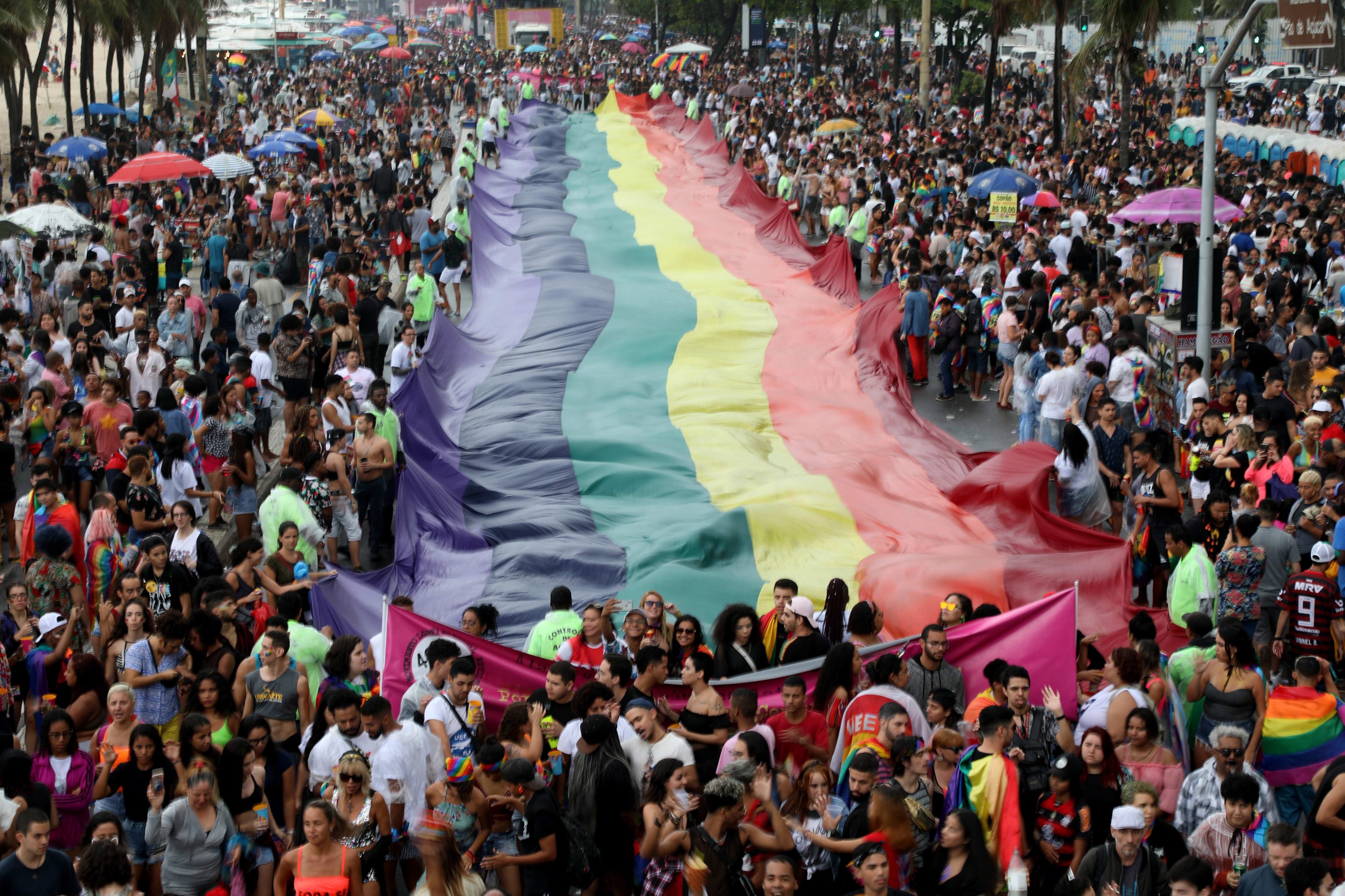
The Copacabana LGBT Pride Parade in Rio de Janeiro, Brazil, September 2019. Credit: Fabio Motta/EPA
Brazil
Jair Bolsonaro, the country’s right wing and authoritarian-minded president, has taken many swipes against LGBTQ people. Since his election in 2019, his government has attempted several times to ban “gender ideology” in schools, all of which have so far been struck down by courts. The country continues to have a very high murder rate of trans people—according to one report, there were 130 killings in 2019—particularly of Afro-Brazilian trans people.
Brunei
An international outcry persuaded the sultan of Brunei, Hassanal Bolkiah, to back down from his 2019 promise to condemn those charged with having gay sex to death by stoning. But the country is still adhering more broadly to the Shariah law provisions he introduced. In January, the independent media outlet the Borneo Bulletin reported that a man had been arrested for hiring two men for sexual services (who he allegedly did not pay) and for stealing some of their clothing and a mobile phone. He is the first person tried for homosexuality under the new provisions.
Egypt
Although same-sex sexual activity is not illegal in Egypt, authorities are skilled at using other laws—like those against prostitution, debauchery and cybercrime, for example—to criminalize LGBTQ people. “They are using vague texts saying this or that is illegal,” says Nora N., legal aid program director for Bedayaa, an organization promoting “sexual orientations, gender identities, gender expressions and sex characteristics rights” in Egypt and Sudan. Founded in 2010, Bedayaa grew out of the same optimism that fuelled the Egyptian revolution of 2011.
“When you’re in a dark cell with no one supporting you, you want to make sure that others in that spot won’t have to go through it alone.”
President Abdel Fattah al-Sisi has led Egypt, the most populous country in the Middle East, since 2014 and his government has been targeting LGBTQ people to demonstrate that it’s a worthy “protector of the morality, protector of family values, protector of traditions,” says Nora, who is based in Cairo. In 2017, the government arrested 33 people over the course of a week after rainbow flags were waved during a Cairo concert of Lebanese indie rock band Mashrou’ Leila. “It’s a very religious country and the rainbow incident started a conversation not in the most positive light,” Nora says. (One of those arrested for raising a flag at the concert sought asylum in Canada after being tortured in prison. She recently took her own life.) There have been several recent attempts to explicitly criminalize homosexuality in the country, though none have yet passed into law.
Sarah’s Cairo, September 2017 – Remembering a night of infinite possibilities of a fairer and brighter future. #SarahHegazi, Rest in power Rest in Pride pic.twitter.com/1vKohTBq9N
— Mashrou’ Leila (@mashrou3leila) June 19, 2020
Last year, according to Nora, there were at least 100 cases of gay men being arrested. “It’s normal. People have this assumption that it only happened during the rainbow [flag] incident because of the media focus, but it happens annually,” she says. There are frequent cases of online entrapment: Men being rounded up in gay hangout spots or even arrested at home or at a hotel based on tips provided to the police.
Nora herself was arrested a couple of times in 2011 while working with the Free Socialist Revolutionary Movement, an experience that prompted her to get involved with Bedayaa. “When you’re in a dark cell with no one supporting you, you want to make sure that others in that spot won’t have to go through it alone,” she says.
Hungary
Prime Minister Viktor Orbán’s “family first” policies have exploited LGBTQ people in order to court right-wing Christian groups. In a landslide vote in Parliament in May, the government passed a law banning legal gender recognition for trans people. Activists say that the law is not only unconstitutional, but fails to reflect the views of the majority of Hungarians.
Indonesia
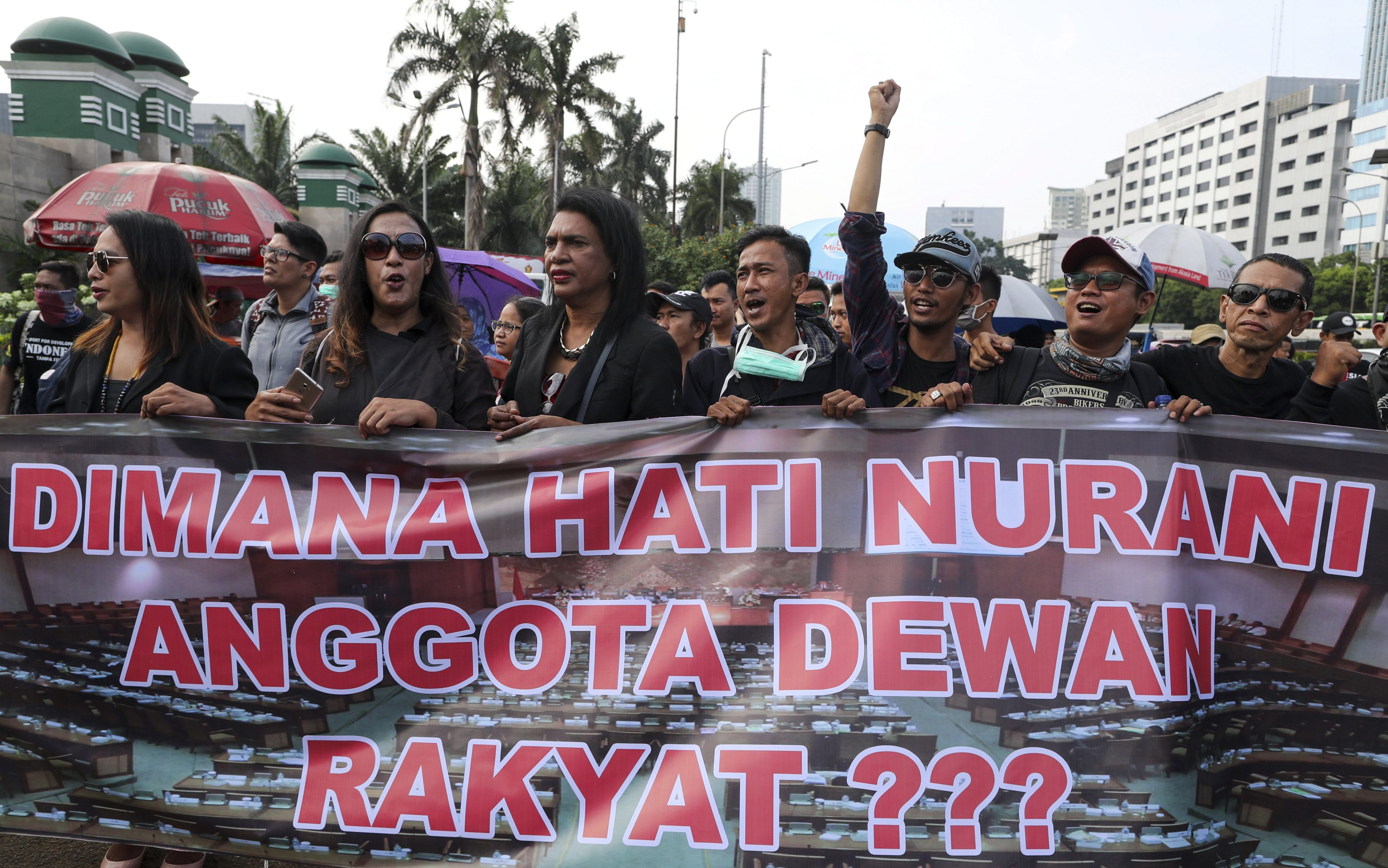
Indonesian LGBT and woman's rights activists protest against proposed changes to the criminal code outside the parliament building in Jakarta, Indonesia, in 2018. Credit: Mast Irham/EPA
President Joko Widodo’s government has introduced a new draft criminal code that would punish extramarital sex, likely including same-sex activity, by up to one year in jail. Activists worry that sections targeting obscene acts in public and pornography could also be used to arrest LGBTQ people. A similar government initiative was introduced in 2018, but it was thrown out.
Kenya
In the last year or so, the Kenyan court system has dealt several blows to LGBTQ and intersex people in the East African nation. In May 2019, the country’s high court upheld sections of the penal code that criminalize gay sex. The ruling came as a disappointment, considering that the constitution Kenya adopted in 2010 was considered to be more progressive, and that neighbouring Angola had decriminalized same-sex sexual activity a few months earlier. Then, in April 2020, another court refused to lift a ban on the 2018 lesbian romance Rafiki, the first Kenyan film to premiere at the Cannes Film Festival.
“Things seem to have regressed,” says Muthoni Ngige, chairperson of the Lesbian Bisexual Queer (LBQ) anti-oppression group Minority Womyn in Action (MWA). “After the [penal code] ruling, we could see a rise in prejudice levels, blackmailing of gay men. We have experienced more homelessness for LBQ folks who have been kicked out of home. People have been beaten up. I don’t know if I have anything positive to say about the way LGBT rights are going.”
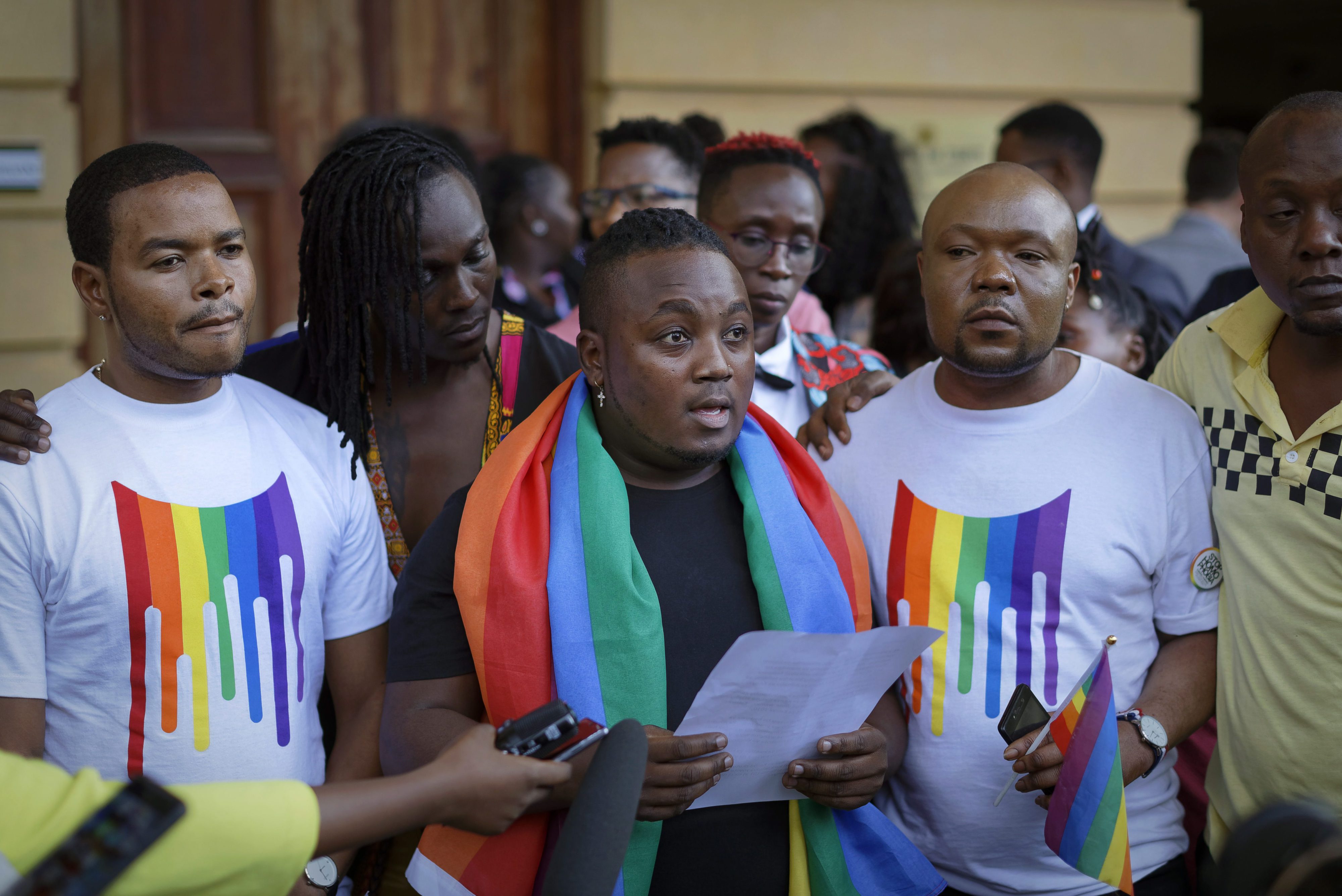
Representatives of the LGBT community in Nairobi read a statement after Kenya's High Court upheld sections of the penal code that criminalize same-sex relations. Credit: Ben Curtis/AP Photo
Ngige, who lives in Nairobi, the country’s capital, has been working on queer issues since 2011. She says that at least there is lots of strength in the movement—MWA, which receives funding from Canada’s Stephen Lewis Foundation, is a member of the Gay and Lesbian Coalition of Kenya, a national umbrella group. “I’m seeing a lot more effort to change things,” Ngige says.
Kennedy Olango, program manager of Kisumu-based Men Against AIDS Youth Group (MAAYGO), says that in 2018 the organization’s space was raided and its people harassed. But there has been no violence from the police in the last two years as MAAYGO has worked to improve relationships with the ministry of health, police, area chiefs and village elders. “But we still see incidents of stigma and discrimination,” says Olango, who was a grand marshal at Montreal Pride in 2018. People who are found out to be LGBTQ are often turned out of their homes—homophobic attitudes harm people economically, as well as mentally and physically. “There are a lot of mental health issues, depression cases,” Olango says. “We’re seeing a lot of cases of attempted suicide, violence against the community and violence within the community—that is, domestic-partner violence.”
Poland
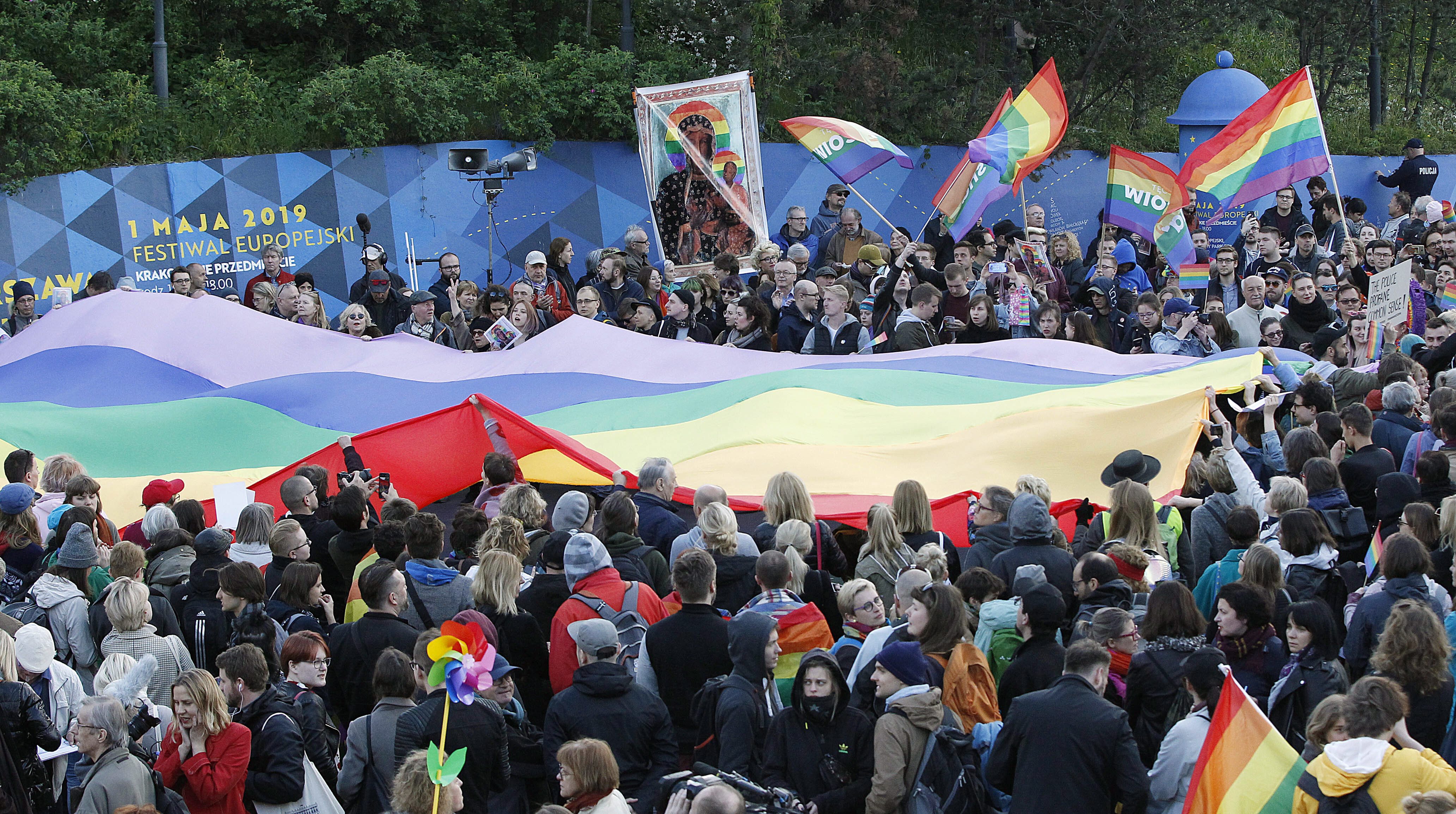
Poles protest the detention of human rights activist Elżbieta Podleśna in Warsaw, Poland, in 2019. Credit: Czarek Sokolowsk/AP Photo
Mateusz Morawiecki, who was elected prime minister in 2017, has been continuing his populist Conservative party’s strategy of attacking LGBTQ people to polarize the population against Europe’s “social experiments.” The dog whistling seems to be working. Almost 100 municipalities in Poland have declared themselves “LGBT free,” posting signs to discourage tolerance of queer people.
Russia
Svetlana Zakharova started working with the Russian LGBT Network during the run-up to the 2014 Winter Olympics in Sochi, an event that became a flashpoint for protests against President Vladimir Putin’s “gay propaganda” law. The 2013 law bans the “promotion of non-traditional sexual relations to minors” and has been broadly used to silence LGBTQ voices in the world’s ninth most-populous country.
“I wanted to do something and have the feeling of belonging,” says Zakharova, the network’s Saint Petersburg-based communications director. As an umbrella group connecting smaller organizations, the network reaches tens of thousands of people a year.
Putin’s propaganda law has, counterintuitively, nurtured a much more organized LGBTQ civil society and triggered broader social awareness. “Now, even my grandmother would recognize the [LGBTQ] abbreviation,” Zakharova says.
Though surveys suggest that Russian young people are becoming more tolerant, hate crimes have increased significantly. “I don’t think Russian people are homophobic by nature, but the authorities promote this image of homosexual, bisexual and transsexual people as perverts, sick people or agents of the corrupted west,” Zakharova says.
The Russian Republic of Chechnya carried out anti-gay purges in 2017, and persecution of LGBTQ people still takes place there. Nationally, police departments often refuse to register crimes committed against LGBTQ people and, in some jurisdictions, officers set up sting operations via dating apps to extort money from men who have sex with men.
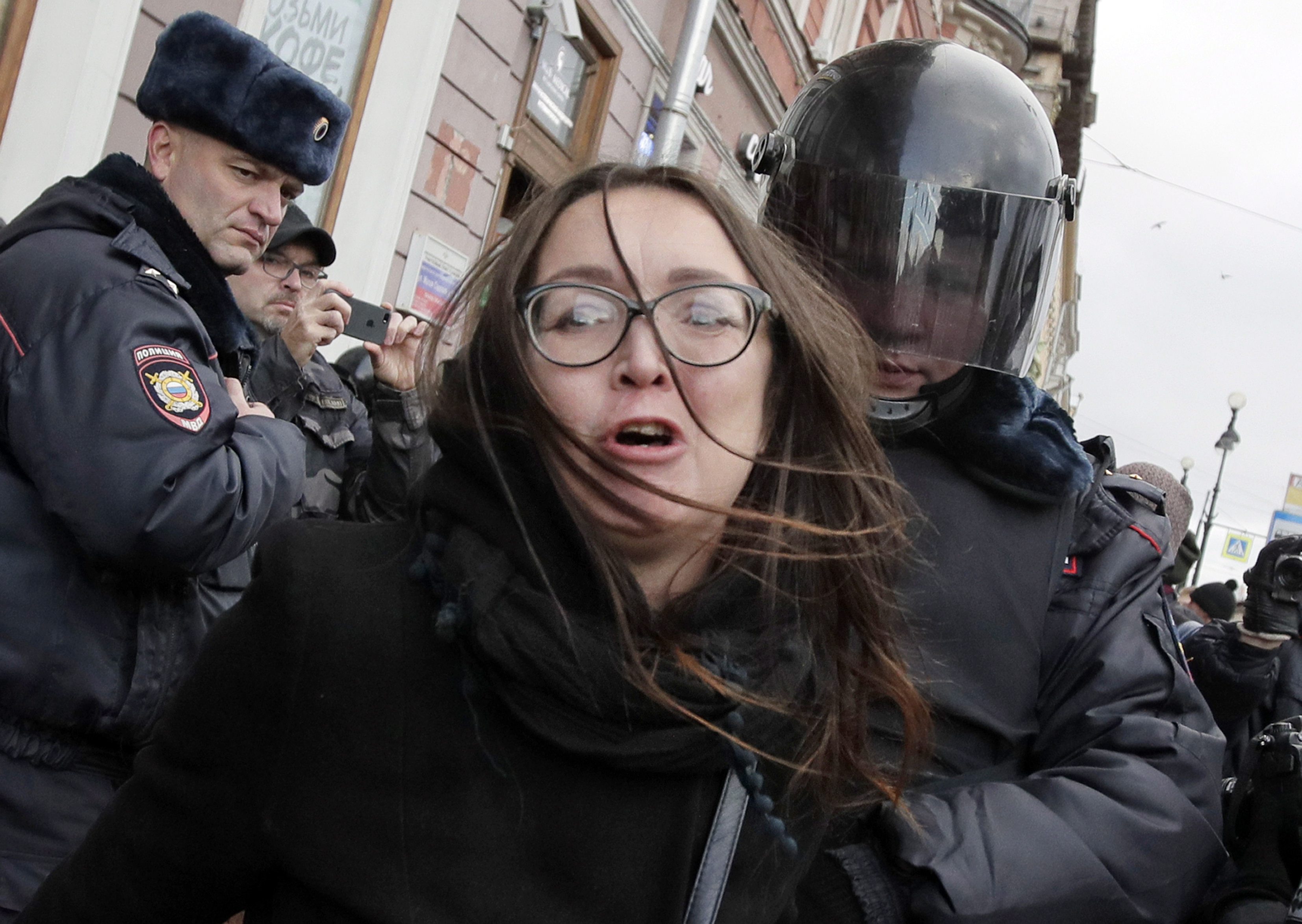
Police detain political and LGBT rights activist Yelena Grigoryev during a rally in St. Petersburg, Russia, in October 2018. She was murdered nine months later. Credit: Dmitri Lovetsky/AP Photo
Last year, a hit list with the names and personal information of 23 activists and journalists was circulated along with a call to hunt and kill the listed people. One of the people named on the list, Yelena Grigoryeva, was murdered, though Zakharova suggests that her death may not have been connected to the list. “But it’s hard to say because the police didn’t even properly investigate this case,” she says. A similar list was published online in May 2020.
Tanzania
As one of the countries whose penal code lists life imprisonment as punishment for “carnal knowledge against order of nature,” Tanzania has long been a country where it’s hard to be LGBTQ or intersex. Things got worse after the 2015 election of President John Magufuli. Since then, the government has suspended the registration of any charity or non-governmental organization that is seen to be supporting homosexuality, and has shut down HIV/AIDS programs and other health services serving men who have sex with men. In 2018, according to an ILGA World report, the government set up a taskforce to “hunt” gay people, forcing activists to hide for their own safety. Authorities there also use “anal examinations” to root out and persecute men who have sex with men.
“The lives of the LGBT community has become much more complicated, with arrests, human rights violations and hate speech from government officials,” says John Kashiha, program director for the Centre for Public Health Laws, Social Economic Rights and Advocacy (CENTA) in Dar es Salaam, Tanzania’s largest city. Established in 2008, and also supported by the Stephen Lewis Foundation, the centre provides support and resources to LGBT and other vulnerable community members, as well as more than 20 smaller organizations across the country.
In 2017, Kashiha himself was among 13 activists arrested during a meeting held in response to the government’s restrictions on health services. He spent 10 days in jail and was subjected to an anal examination. “[The raid] was one of those political actions which you just can’t control,” he says. That same year, Kashiha says there were about 18 known cases of police arresting and detaining other community members.
“We don’t have the freedom to speak up for what we feel or what we want, or to access the justice system,” Kashiha says. “Most people are actually hiding or living a double life, which puts them at increased risk for HIV.” In 2018, 24,000 people in Tanzania died of AIDS-related illness.
The government messaging around LGBTQ issues has increased negative attitudes in the general public (it’s even blamed the COVID-19 pandemic on homosexuals). “We’re expecting five more years of the same,” Kashiha says.
Global bright spot
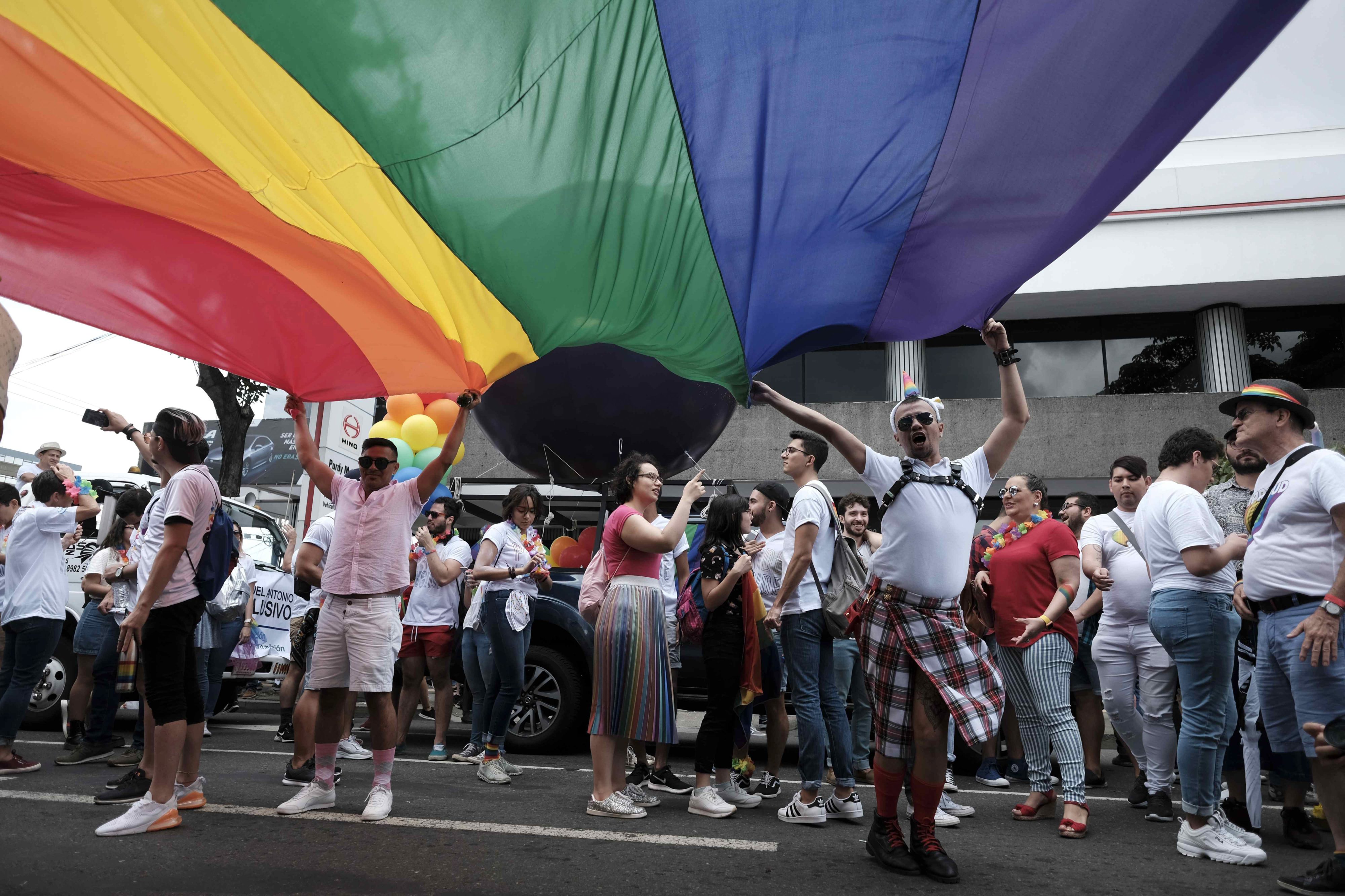
People participate in the Pride March in San Jose, Costa Rica in 2019. The march was the first held since the country legalized same-sex marriage, a reform that didn't go into effect until May 2020. Credit: Jeffrey Arguedas/EPA
Costa Rica
In August 2018, Costa Rica’s supreme court gave the government 18 months to get rid of laws that prevented same-sex couples from marrying. But LGBTQ activists in the Central American nation didn’t spend those months sitting around quietly waiting for the ruling to take effect. A coalition of 36 LGBTQ and human-rights groups was founded to create a campaign targeting the hearts and minds of their fellow citizens.
“If you see most organizations for LGBT rights, most of the people are lawyers or people studying sociology,” says Nisa Sanz, a professional marketer who took on the role of executive director of the campaign, called Sí Acepto (“I Do”). “Of course, we need lawyers to fight for this,” Sanz says. “But my main concern was not the legalization. We were not addressing the culture change.”
“My main concern was not the legalization. We were not addressing the culture change.”
A Spanish-speaking country of about five million people, Costa Rica is constitutionally Roman Catholic, but has seen the rise of conservative Christian evangelical groups over the last few decades, Sanz says. While residents of the Central Valley, where the capital San José is located, tend to be more open-minded, that’s not true of many rural areas. A survey by the coalition suggested that roughly 25 percent of Costa Ricans supported same-sex marriage, while 25 percent were vehemently against it and unlikely to change their minds. So Sí Acepto focused on the 50 percent who were in the middle. The campaign recruited allies—next-door neighbour-type straight people wishing the best for their LGBTQ friends and relatives—for mainstream and social media testimonies and a series of town halls held in community centres across the country.
“If we didn’t give a different perspective to the people, we were going to increase polarization, and people were going to feel forced to have a change they didn’t vote for,” Sanz says. A follow-up survey scheduled for this summer will hopefully reveal how successful the Sí Acepto campaign was.
Even before the campaign, attitudes had been changing. Back in the 1990s, Sanz, who is 50, remembers having to scramble to find a male dance partner when police would show up to harass people in gay bars. A decade ago, Costa Rica’s first Pride celebration attracted fewer than 20 people, she says. Last year’s was attended by tens of thousands.
Sanz, who was born in Costa Rica, used to live in Europe and legally married her Swiss wife a decade ago. But when the family moved to Costa Rica five years ago, Sanz’s wife suddenly had no legal relationship to Sanz and their three children. “I became a single mom automatically,” Sanz says. “When I went to the civil registration office, they said, ‘This lady is nothing for us.’ [The clerks] changed the last names of the kids.”
Now their Costa Rican marriage, one of approximately 100 marriages which took place in the first three weeks after legalization, is better than what they’d have in Switzerland, which still doesn’t grant co-parenting or adoption rights to same-sex couples.
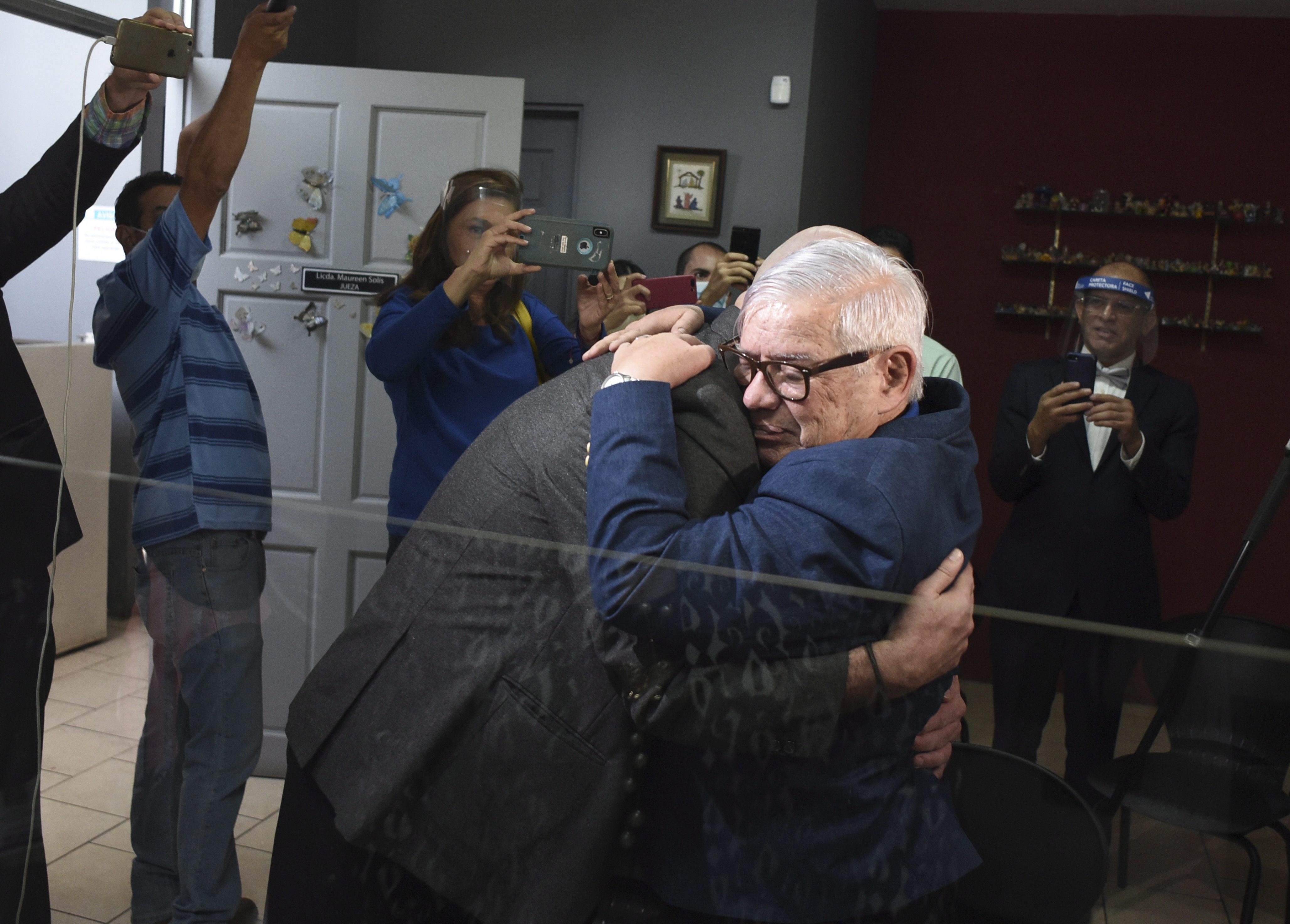
Activist Marco Castillo (right) embraces his husband Rodrigo Campos after they were married before a judge in San José, Costa Rica, on May 26, 2020, the day same-sex marriage became legal in the country. Credit: Carlos Gonzalez/AP Photo
The week that same-sex marriage became legal, Sanz’s family was invited for breakfast with President Carlos Alvarado Quesada and his wife Claudia Vanessa Dobles Camargo. Alvarado Quesada handily won the 2018 election during which his support of the court ruling—and his opponent’s opposition to it—was a major factor.
“He was with the first lady waiting for us in the main door of the presidential house. Normally you only see that when they receive another president,” Sanz says. “I knew that the gesture was not to [just our family], but to all the people who had been behind this fight for four decades.”
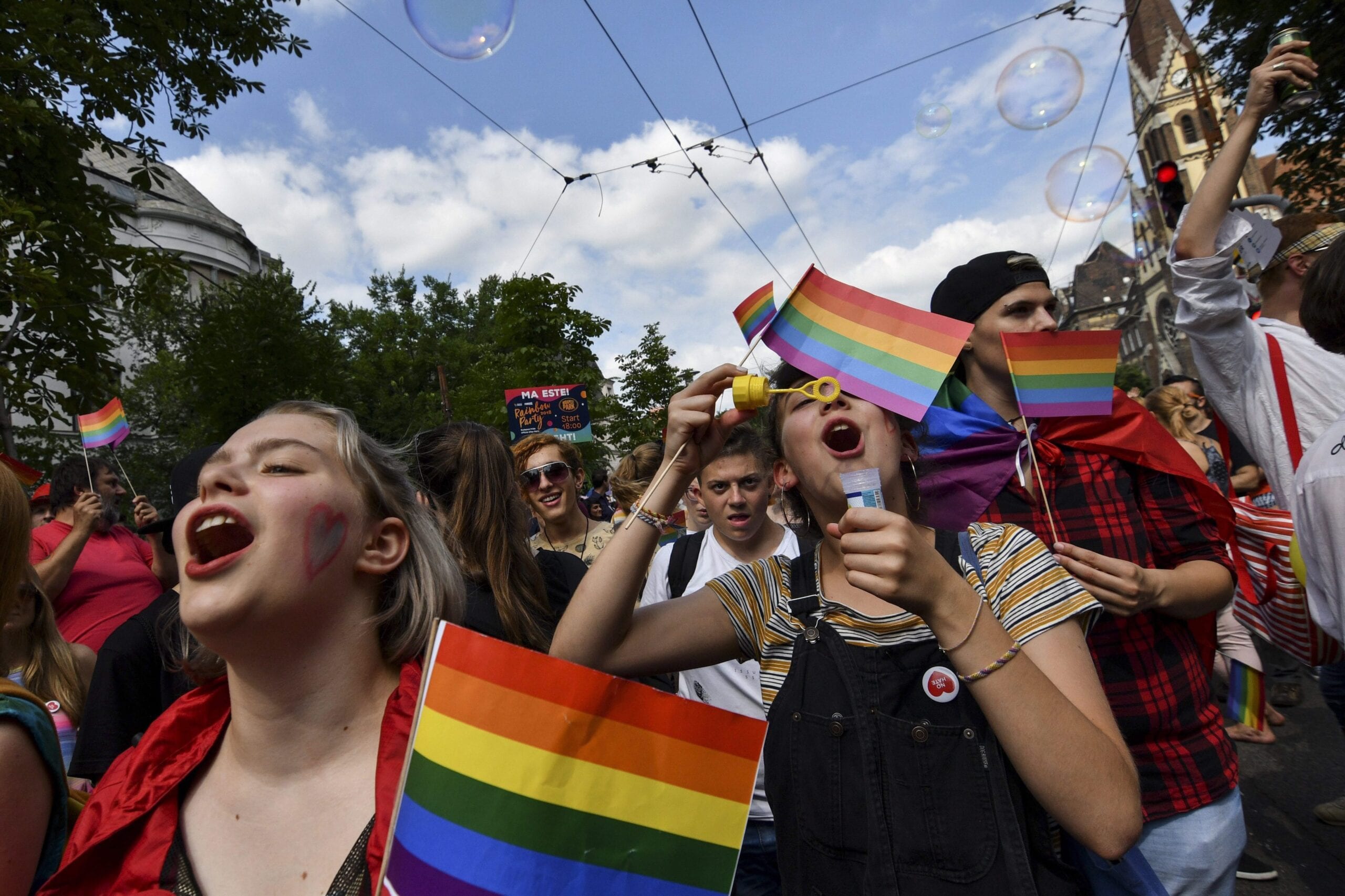

 Why you can trust Xtra
Why you can trust Xtra


